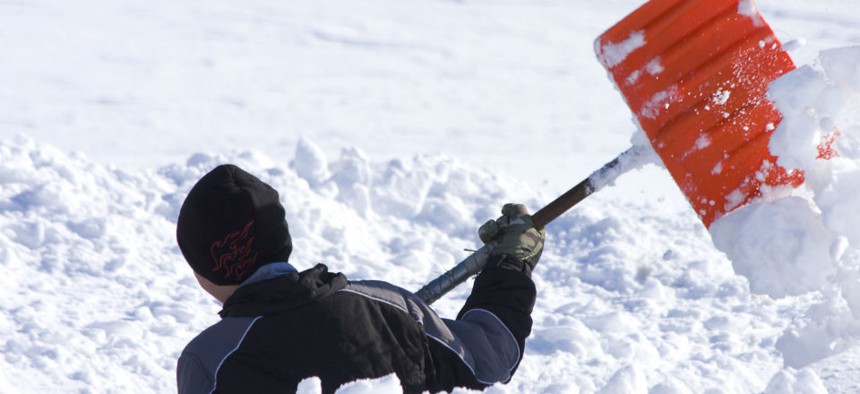
Trudy Wilkerson/Shutterstock.com
Snow Days: When Government Resorts to Naming and Shaming
Will a neon notice on the front door really convince citizens to shovel their walks?
The winter of 2015 has set records in Massachusetts. Snow records. Over eight and a half feet have already fallen in Boston. In February alone, over five feet.
With snow come all sorts of inconveniences. From a two-foot storm in January and another two-foot storm in February came big inconveniences. The good news is that the citizens of Massachusetts are stronger. The bad news is that their new, upgraded muscles and stamina resulted from shoveling snow.
Of course, not everyone shovels their snow. This can be annoying. If homeowners don’t shovel their sidewalks, people have to walk in the street. This is dangerous—particularly when the plows have left mountains of snow, preventing drivers from seeing around corners.
Thus, most municipalities require homeowners to shovel their sidewalks. It’s the law. That, however, does not mean that everyone does it. Then what?
In one Massachusetts municipality, overnight snow must be cleared by 10 o’clock in the morning. Daytime snow by 10 o’clock at night. And before this winter began, the municipality increased its fine for the first offense to $50. For the third, it’s now $200.
Fines, however, do not ensure clean sidewalks. So this municipality added another incentive. At a house with a snow-covered sidewalk, a city inspector hangs a large neon-yellow sign on the front door.
One member of the municipal council called it a “Scarlet Letter approach.” “The idea,” he explained, “was to have something significant that caught people’s eyes to let them know, ‘ That’s the perpetrator.’”
“We’re not trying to shame anyone” declared a city inspector. “We are trying to change their behavior.”
But to change this uncivilized behavior, the city is, indeed, naming and shaming the miscreants. Not that the city didn’t give them significant warning. And the behavior for which they are being shamed is certainly a failure in their legal, civic, and societal responsibility. If a big fine isn’t enough to change behavior, maybe some visible, public censure will.
Still, some homeowners may not accept that shoveling the sidewalk is their responsibility. Usually, the homeowner does not own the sidewalk. The municipality does. Still, the law usually makes the homeowner responsible for much about the sidewalk, including its repair.
H. L. Mencken famously observed that “conscience is the inner voice that warns us somebody may be looking.” Naming and shaming is a very public voice announcing that somebody has certainly been looking—and that others will soon be too.
With people who have no conscience, naming and shaming isn’t effective. Shaming a dictator for violating human rights will not have much impact. He has already announced (quite explicitly) that he does not care. Indeed, within the Dictator Club, being named and shamed might be a badge of honor.
Still, even if you have no personal conscience—even if you don’t feel in the least bit guilty about not shoveling your sidewalk—you still might care what your neighbors think. You might want to save face. Even though the neighbors can see that you failed to shovel your sidewalk, you might not want them to be blatantly reminded with a large neon sign. You prefer that your neighbors think kindly of you. (An absentee landlord, whom the neighbors never see, will care little about such shaming.)
Still, is it proper for government to engage in public shaming? After all, it has many other ways to punish the non-shovelers. An ever larger fine might be both an appropriate punishment and an adequate motivator.
Shaming, writes Jennifer Jacquet of New York University, is “exposing a transgressor to public disapproval.” But is this an acceptable activity for government? (1) Should it expose citizen transgressors in any way? (2) Should it seek to mobilize public disapproval against this transgressor?
Also, is a “Scarlet Letter” strategy effective? Neither it nor the humiliation of the stocks had the desired effect on Hawthorne’s Hester Prynne, who thought neither fit her “crime”—or, indeed, that it even was a crime.
Today, not shoveling your sidewalk is formally a crime. And to most citizens, it must certainly be socially unacceptable. (In this municipality, shoveled sidewalks have to be 42 inches wide to accommodate wheelchairs. And the city helps senior citizens find teenagers whom they can pay to do their shoveling.)
Announcing which citizens have not paid their taxes is a common shaming strategy for many governments. But should this announcement be on a website? Should it be mailed to every taxpayer? A different municipality (in a different state) has mailed such a report to every property owner listing who had—and had not —paid their property taxes.
It made for juicy cocktail-party conversation. The next year, I bet, tax evasion went down.
Robert D. Behn, a lecturer at Harvard University's John F. Kennedy School of Government, chairs the executive education program Driving Government Performance: Leadership Strategies that Produce Results. His book, The PerformanceStat Potential, was recently published by Brookings.
Copyright 2015 Robert D. Behn
(Image via Trudy Wilkerson/Shutterstock.com)






